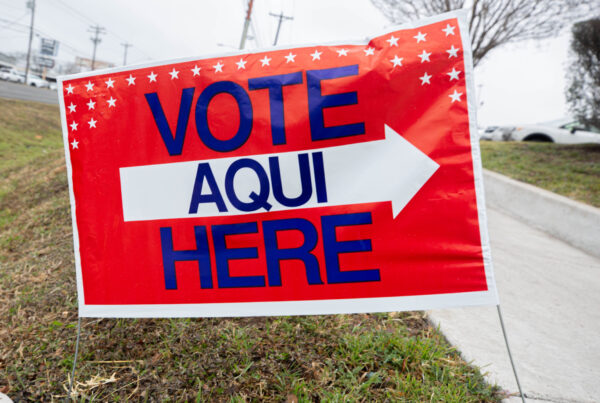It is said that in stand-up comedy, it’s important to embrace who you are. For Laredo native Vanessa Gonzalez, being Mexican-American and growing up on the border built a solid foundation for laughs.
With multiple comedy specials under her belt and her jokes going viral, Gonzalez is now part of the PBS docuseries “Roots of Comedy with Jesus Trejo” premiering on PBS.org and the PBS App this Friday and airing on PBS on June 21.
Gonzalez spoke with the Texas Standard on being raised in Laredo, her parents working for border patrol, and being surrounded by a community that loves to laugh.
This transcript has been edited lightly for clarity:
Texas Standard: Tell us a little bit more about growing up in Laredo and how that’s influenced what you talk about on stage.
Vanessa Gonzalez: Well, you know, growing up in a border town, Laredo specifically – which, people who aren’t from South Texas are always like, “oh, you’re from the Rio Grande Valley.” And I’m like, “no. But it’s close.” But I like to clarify, because Laredo and people from the RGV get upset. So I’m like,” it’s not the Rio Grande Valley.” But we’re very similar.
And I feel like being from Laredo, like everybody’s a jokester. Growing up there, my whole family, all of my friends, like everybody I know that’s from Laredo and the border just loves to crack jokes on themselves, on each other.
So I feel like being from a place that’s filled with, like, people that just love to make fun of themselves and each other has influenced me and made me the comedian that I am now.
Now that’s really interesting you say that, because I’m thinking, I never thought that people in the RGV took themselves more seriously than folks in Laredo. Is that the big difference, you think?
Well, I don’t know. I mean, honestly, I have friends from Brownsville, Texas, and we’re always talking about our childhood – so I feel like in terms of experience, yeah, maybe they’re a couple hundred miles apart, but it’s still the same.
» GET MORE NEWS FROM AROUND THE STATE: Sign up for Texas Standard’s weekly newsletters
I guess the sense of humor and the willingness to sort of poke fun at how things go and that kind of thing, you picked up on it in Laredo, it sounds like.
I want to reflect on something you said in the show. You said the border stories that are told in the media, they tend to go the way of “Narcos” or “Sicario.” But your comedy obviously reflects a different sort of story. Can you say more about that?
You know, it’s funny, I’d always seen the border depicted in movies and TV like this scary place and where there’s all this, like, crime and cartel. I was always just like, that’s never been my experience.
And then when I moved to L.A. – I lived in L.A. from 2018 to 2020 – and I started telling people that I’m from the border and that my parents worked for U.S. Customs and Border Patrol, they were like, “what?” Like that just didn’t compute to them. And I’m like, “oh no, yeah, like at the border, it’s like Mexicans telling Mexicans not to come in” and they’re like, “what?” And I’m like, “yeah, that’s kind of how it works.”
And growing up there, I didn’t know any different. I grew up in a high school where 99% of us were Mexican, Mexican American, documented, undocumented. A lot of other kids’ parents worked at U.S. Customs and Border Patrol as well.
So I just knew that we all kind of grew up mixed in all together, but there was never, like, a fear or a like, “oh, you’re this and that.” We all just saw each other as the same. So as I try to explain that to people that aren’t from Texas, aren’t from South Texas, it’s always funny to me that they’re always just caught off guard by how that works.
I think it’s really interesting how, if you’re not there, you sort of divide things up along ideological lines. Your expectations are built that way.
When you’re living someplace, that means living. That means paying for stuff. That means, you know, being around other people. And your perception of what normal is, well, it’s distinct in a place like Laredo.
Oh, 100%. And my grandma, you know, she is an immigrant – was an immigrant; rest in peace – from Mexico, and she would always make fun of my mom for working [for border patrol]. She just thought it was funny, like, “how did I end up coming to America, and now my daughter works, you know.”
And that’s where I get my sense of humor from. She always pointed out kind of the absurdities. And she would say, “well, I’m not U.S. citizen, but my socks say USA so that they think that I’m U.S. citizen.” So she would wear socks that say USA on them, and that was like her form of identification.















